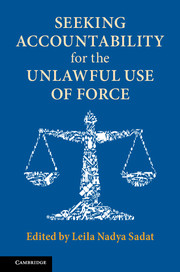Book contents
- Frontmatter
- Dedication
- Contents
- Notes on Contributors
- Foreword
- Preface
- Table of Cases
- Introduction
- PART I HISTORIC AND CONTEMPORARY PERSPECTIVES ON THE UNLAWFUL USE OF FORCE
- PART II MECHANISMS FOR RESTRAINING THE UNLAWFUL USE OF FORCE AND ENHANCING ACCOUNTABILITY
- PART III THE ILLEGAL USE OF FORCE AND THE PROSECUTION OF INTERNATIONAL CRIMES
- 12 The Crime of Aggression under Customary International Law
- 13 The Crime of Aggression and the International Criminal Court
- 14 Prosecuting Aggression Through Other Universal Core Crimes at the International Criminal Court
- 15 The Illegal Use of Force (Other Inhumane Act) as a Crime Against Humanity: An Assessment of the Case for a New Crime at the International Criminal Court
- 16 Aggression, Atrocities, and Accountability: Building a Case in Iraq
- PART IV IMAGINING A BETTER WORLD
- Epilogue
- Index
15 - The Illegal Use of Force (Other Inhumane Act) as a Crime Against Humanity: An Assessment of the Case for a New Crime at the International Criminal Court
from PART III - THE ILLEGAL USE OF FORCE AND THE PROSECUTION OF INTERNATIONAL CRIMES
Published online by Cambridge University Press: 21 May 2018
- Frontmatter
- Dedication
- Contents
- Notes on Contributors
- Foreword
- Preface
- Table of Cases
- Introduction
- PART I HISTORIC AND CONTEMPORARY PERSPECTIVES ON THE UNLAWFUL USE OF FORCE
- PART II MECHANISMS FOR RESTRAINING THE UNLAWFUL USE OF FORCE AND ENHANCING ACCOUNTABILITY
- PART III THE ILLEGAL USE OF FORCE AND THE PROSECUTION OF INTERNATIONAL CRIMES
- 12 The Crime of Aggression under Customary International Law
- 13 The Crime of Aggression and the International Criminal Court
- 14 Prosecuting Aggression Through Other Universal Core Crimes at the International Criminal Court
- 15 The Illegal Use of Force (Other Inhumane Act) as a Crime Against Humanity: An Assessment of the Case for a New Crime at the International Criminal Court
- 16 Aggression, Atrocities, and Accountability: Building a Case in Iraq
- PART IV IMAGINING A BETTER WORLD
- Epilogue
- Index
Summary
I remind you that 23 members of the United Nations have bound themselves by the Charter of the Nuremberg Tribunal to the principle that planning, initiating or waging a war of aggression is a crime against humanity for which individuals as well as states shall be tried before the bar of international justice.
– United States President Harry S. TrumanINTRODUCTION
The law makes a fundamental distinction between peace and war. During times of war, the extensive peacetime constraints on the exercise of violence are relaxed and give way to the far more permissible rules of international humanitarian law (IHL) as informed and influenced by human rights law. As a result, we would like to think that in our modern world, unlike in times gone by, war is no longer a free-for-all in which victory is put above any law, morality, or humanity – the famous Martens Clause can be cited as evidence of this mentality. Yet, crimes inevitably occur in armed conflict – one would be hard-pressed naming a war that was completely bereft of criminal activity. Indeed, if one were to speak to anyone who has actually lived through and fought in wars – rather than only having read about them – they will attest to the horrors, bloodshed, and anguish that they entail. The effects of war do not end when the firing stops. Even where international humanitarian law is generally respected, mentally, if not psychically, the men and women who experience war firsthand soon realize that they are no longer the same person. War has a way of fundamentally changing all those involved – and not necessarily for the better. It is thus not surprising when, during remembrance services around the world every year, mature men and women who lived through the effects of armed conflicts that ended many decades ago still vividly remember their experiences. So much so that it brings many of them to tears.
This is perhaps why the International Military Tribunal (IMT) at Nuremberg was of the opinion, as far back as 1947, that “[w]ar is essentially an evil thing.”
- Type
- Chapter
- Information
- Seeking Accountability for the Unlawful Use of Force , pp. 386 - 424Publisher: Cambridge University PressPrint publication year: 2018
- 4
- Cited by



